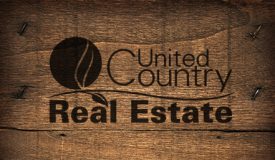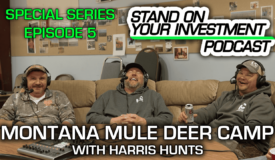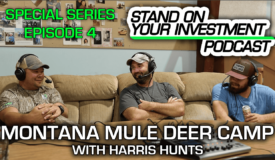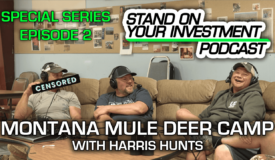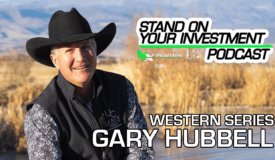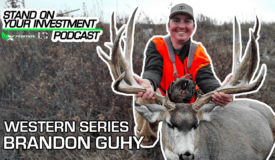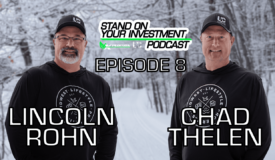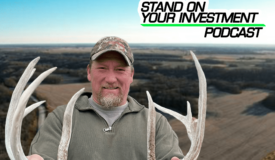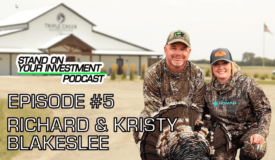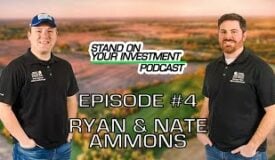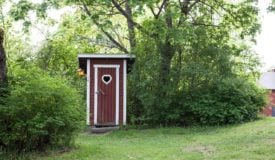Montana Mule Deer Day 5 Recap |…
October 28, 2023
Welcome to Montana! The UC Hunting Properties crew is back out west with Harris Hunts to put a stalk on...
Montana Mule Deer Day 4 Recap |…
October 27, 2023
Welcome to Montana! The UC Hunting Properties crew is back out west with Harris Hunts to put a stalk on...
SUCCESS! Montana Mule Deer Day 3 Recap…
October 26, 2023
Welcome to Montana! The UC Hunting Properties crew is back out west with Harris Hunts to put a stalk on...
SPECIAL LOCATION! Montana Mule Deer Day 2…
October 25, 2023
Welcome to Montana! The UC Hunting Properties crew is back out west with Harris Hunts to put a stalk on...
Montana Mule Deer Day 1 Recap |…
October 24, 2023
Welcome to Montana! The UC Hunting Properties crew is back out west with Harris Hunts to put a stalk on...
Welcome to “Afghanistan” | Montana Mini Series…
October 23, 2023
Welcome to Montana! The UC Hunting Properties crew is back out west with Harris Hunts to put a stalk on...
Get It While You Still Can! Colorado…
October 13, 2023
It’s undeniable that Colorado is one of the top states when it comes to natural beauty and when you do...
Why You Should Be Buying Land In…
October 10, 2023
There are a lot of benefits to owning land in the state you want to hunt and that is even...
So you want to film your own…
July 8, 2023
Ever wondered what it takes to capture your own hunts on camera? Tyler Arnold & David Little with UC Land...
Stand On Your Investment Podcast – Slade…
June 8, 2023
Slade Priest is the Number 1 agent in all of United Country at nearly 80 million dollars in real estate...
Stand On Your Investment Podcast – Brandon…
May 16, 2023
The dynamic duo of southwest Wisconsin is back again! In this episode, we get the origin stories of Joe &...
Stand On Your Investment Podcast – Jeff…
May 2, 2023
Good friend Jeff Peel, head honcho at Tactacam and Reveal by Tactacam, stops by and the crew sits down to...
Stand On Your Investment Podcast – United…
May 1, 2023
The 2023 United Country National Convention was a major success and has left our schedules jam-packed but we found some...
Stand On Your Investment Podcast – Brandon…
May 1, 2023
Brandon & Joe are the A-Team in southwest Wisconsin when it comes to real estate but they are studs in...
Stand On Your Investment Podcast – Iowa…
March 12, 2023
John Bunge, president of the Iowa Deer Classic joins the podcast crew for a quick chat about the growing success...
Stand On Your Investment Podcast – Chad…
March 12, 2023
The Podcast Crew heads to Michigan to welcome the newest UC Hunting Properties members. Broker Chad Thelen & Agent Lincoln...
𝙎𝙩𝙖𝙣𝙙 𝙊𝙣 𝙔𝙤𝙪𝙧 𝙄𝙣𝙫𝙚𝙨𝙩𝙢𝙚𝙣𝙩 𝙋𝙤𝙙𝙘𝙖𝙨𝙩-What is This…
February 9, 2023
What is the Stand On Your Investment Podcast? Who is UC Hunting Properties? We started this adventure hitting the ground...
𝙎𝙩𝙖𝙣𝙙 𝙊𝙣 𝙔𝙤𝙪𝙧 𝙄𝙣𝙫𝙚𝙨𝙩𝙢𝙚𝙣𝙩 𝙋𝙤𝙙𝙘𝙖𝙨𝙩-Steve Hanson |…
February 1, 2023
Episode 6 has Steve Hanson is one of southern Iowa’s premier whitetail guys! Steve is a successful real estate agent,...
𝙎𝙩𝙖𝙣𝙙 𝙊𝙣 𝙔𝙤𝙪𝙧 𝙄𝙣𝙫𝙚𝙨𝙩𝙢𝙚𝙣𝙩 𝙋𝙤𝙙𝙘𝙖𝙨𝙩 – Richard…
January 25, 2023
Episode 5 has the podcast crew in Kansas in The Bird House at @triplecreekoutfitters3141 with Richard...
𝙎𝙩𝙖𝙣𝙙 𝙊𝙣 𝙔𝙤𝙪𝙧 𝙄𝙣𝙫𝙚𝙨𝙩𝙢𝙚𝙣𝙩 𝙋𝙤𝙙𝙘𝙖𝙨𝙩 – Ryan…
January 18, 2023
The Ammons Brothers out of Albia, Iowa are some of the top performers for UC Hunting Properties year in and...
𝙎𝙩𝙖𝙣𝙙 𝙊𝙣 𝙔𝙤𝙪𝙧 𝙄𝙣𝙫𝙚𝙨𝙩𝙢𝙚𝙣𝙩 𝙋𝙤𝙙𝙘𝙖𝙨𝙩 – Jim…
January 6, 2023
Stand On Your Investment Podcast In Episode 3, the Stand On Your Investment Crew sits down with Jim Jones. Jim...
𝙎𝙩𝙖𝙣𝙙 𝙊𝙣 𝙔𝙤𝙪𝙧 𝙄𝙣𝙫𝙚𝙨𝙩𝙢𝙚𝙣𝙩 𝙋𝙤𝙙𝙘𝙖𝙨𝙩 – Coltyn…
December 14, 2022
Stand On Your Investment Podcast The crew sits down with Josh Genz & Coltyn Bettis and touch on topics such...
𝙎𝙩𝙖𝙣𝙙 𝙊𝙣 𝙔𝙤𝙪𝙧 𝙄𝙣𝙫𝙚𝙨𝙩𝙢𝙚𝙣𝙩 𝙋𝙤𝙙𝙘𝙖𝙨𝙩 – 𝙏𝙤𝙣𝙙𝙤…
November 23, 2022
Stand On Your Investment Podcast In Episode 1 of the podcast, Travis from UC Hunting Properties and Curt & Chris...
RURAL LIVING: SEPTIC SYSTEMS 101
October 29, 2020
Author: Tina Marshall Realtor| Recreational Land Specialist at UC Midwest Lifestyle Properties If you’ve lived in...


